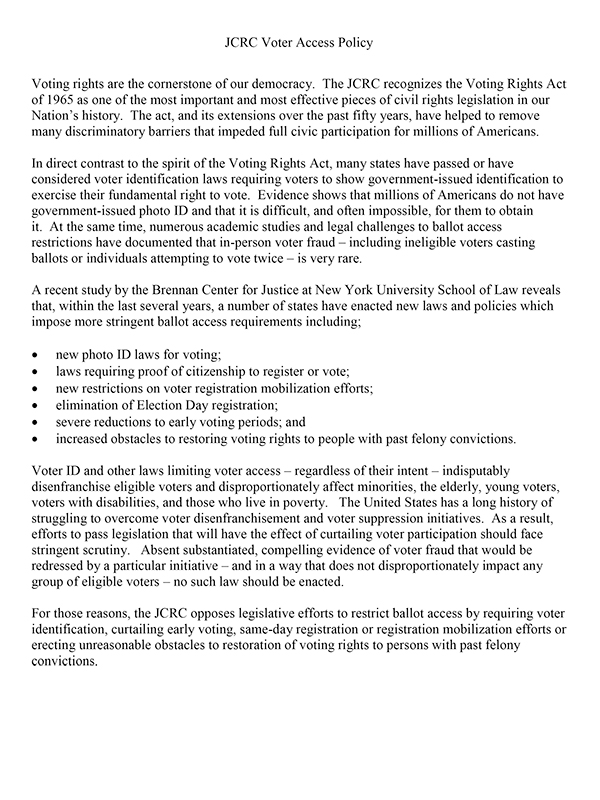Policy Resolution
January 14, 2015
Voting rights are the cornerstone of our democracy. The JCRC recognizes the Voting Rights Act of 1965 as one of the most important and most effective pieces of civil rights legislation in our Nation’s history. The act, and its extensions over the past fifty years, have helped to remove many discriminatory barriers that impeded full civic participation for millions of Americans.
In direct contrast to the spirit of the Voting Rights Act, many states have passed or have considered voter identification laws requiring voters to show government-issued identification to exercise their fundamental right to vote. Evidence shows that millions of Americans do not have government-issued photo ID and that it is difficult, and often impossible, for them to obtain it. At the same time, numerous academic studies and legal challenges to ballot access restrictions have documented that in-person voter fraud – including ineligible voters casting ballots or individuals attempting to vote twice – is very rare.
A recent study by the Brennan Center for Justice at New York University School of Law reveals that, within the last several years, a number of states have enacted new laws and policies which impose more stringent ballot access requirements including;
- new photo ID laws for voting;
- laws requiring proof of citizenship to register or vote;
- new restrictions on voter registration mobilization efforts;
- elimination of Election Day registration;
- severe reductions to early voting periods; and
- increased obstacles to restoring voting rights to people with past felony convictions.
Voter ID and other laws limiting voter access – regardless of their intent – indisputably disenfranchise eligible voters and disproportionately affect minorities, the elderly, young voters, voters with disabilities, and those who live in poverty. The United States has a long history of struggling to overcome voter disenfranchisement and voter suppression initiatives. As a result, efforts to pass legislation that will have the effect of curtailing voter participation should face stringent scrutiny. Absent substantiated, compelling evidence of voter fraud that would be redressed by a particular initiative – and in a way that does not disproportionately impact any group of eligible voters – no such law should be enacted.
For those reasons, the JCRC opposes legislative efforts to restrict ballot access by requiring voter identification, curtailing early voting, same-day registration or registration mobilization efforts or erecting unreasonable obstacles to restoration of voting rights to persons with past felony convictions.
Document
